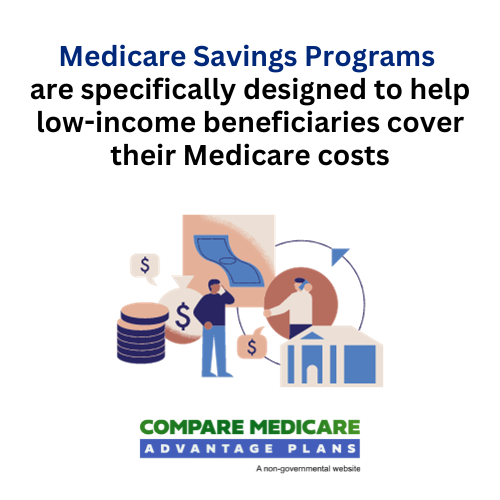Is a Medicare Savings Program the Same as Medicaid?
If you’re wondering if Medicare Savings Programs are the same as Medicaid, these are related but distinct programs, each with its unique purpose. Medicare Savings Programs will likely be designed to help cover certain Medicare expenses for eligible low-income individuals.
This article dives into the nuances of both MSPs and Medicaid, helping you grasp their differences and how they might interact to support your healthcare needs.
Key Takeaways
- Medicare Savings Programs (MSPs) will likely assist low-income Medicare beneficiaries with some of their Medicare costs and differ from Medicaid, which might offer broader healthcare coverage.
- Eligibility for MSPs will likely be based on income and asset thresholds, while several programs may be available to assist with different aspects of Medicare expenses such as premiums and copayments.
- While MSPs may focus on potential Medicare cost assistance, beneficiaries may also receive additional support through other programs like Extra Help for prescription drugs, and in some cases, combine the potential MSP benefits with full Medicaid coverage.
Compare Plans in One Step!
Enter Zip Code
Decoding Medicare Savings Programs and Medicaid
Medicare Savings Programs (MSPs) are state-sponsored initiatives that have been designed to help alleviate the financial burden of Medicare costs for beneficiaries with limited resources. These programs will likely cover a portion or the entirety of out-of-pocket Medicare costs, depending on the beneficiary’s income and assets.
In recent years, the federal government has helped low-income Medicare beneficiaries access MSPs. The potential introduction of a new Medicaid rule could simplify the enrollment process, potentially leading to an increase in enrollees.
This rule may automate applications for individuals with Medicare Part D Low-Income Subsidy and might automatically enroll certain Medicare beneficiaries.

Within the possibility of having an MSP plan, beneficiaries fall into two categories: full-benefit or partial-benefit dual-eligible. Full-benefit dual-eligible beneficiaries may be entitled to comprehensive Medicaid benefits on top of MSP benefits, while partial-benefit dual-eligible beneficiaries may only receive support through MSPs, which may assist with certain Medicare premiums and cost-sharing.
Understanding Medicare Savings Programs

Medicare Savings Programs (MSPs) could serve as safety nets for low-income individuals who may struggle to cover some of their Medicare costs.
These programs could offer a lifeline, possibly helping cover Medicare cost-sharing expenses such as deductibles, copayments, and coinsurance.
There may also be numerous benefits that could be provided by MSPs. These might include potentially reduced Medicare drug plan expenses, discounts on Medicare Part B premiums, and aid with medical insurance premiums, deductibles, copayments, and coinsurance.
Enrollment will likely be based on the program that best aligns with your income, assets, and other details provided on your application.
To enroll, call one of our licensed agents at 1-833-641-4938 (TTY 711), Mon-Fri 8 am-9 pm EST.
The various categories of MSPs that may be accessible may include the Qualified Medicare Beneficiary (QMB) Program and the Specified Low-Income Medicare Beneficiary (SLMB) Program.
The Role of Medicaid in Healthcare Coverage
While MSPs will likely focus on assisting with certain Medicare costs, Medicaid, a state and federal program, may take a broader approach. These could potentially provide comprehensive healthcare coverage for low-income individuals, including certain Medicare beneficiaries. Medicaid may be able to shield individuals from a wide range of healthcare costs that Medicare might not cover.
One of the potential advantages of Medicaid could be its potential coverage of essential services such as prescription drugs, and dental, vision, and hearing coverage.
However, the transition from Medicaid to Medicare, known as the ‘coverage cliff,’ may be challenging for beneficiaries, as they will likely be required to start covering Medicare premiums and cost-sharing expenses, which were previously fully covered by Medicaid.
Comparing MSPs and Medicaid Coverage
While both MSPs and Medicaid will likely aim to provide financial relief to low-income individuals, they may differ in their approach and coverage. MSPs are dedicated programs under Medicaid that have been designed to aid individuals in covering certain Medicare premiums and other cost-sharing expenses.
On the other hand, full Medicaid coverage could offer a more comprehensive healthcare safety net, possibly covering medical services, prescription drugs, and long-term care for eligible individuals.
Individuals who meet the eligibility criteria for Medicaid could potentially avail themselves of benefits from MSPs, such as the SLMB program which may specifically cover the payment of Medicare Part B premiums.
Clarifying Eligibility Requirements for MSPs
Beneficiaries must comprehend the eligibility requirements of MSPs to take advantage of their potential benefits. To be eligible for an MSP, individuals must possess Medicare Part A and satisfy the income and asset thresholds for their state.
The eligibility evaluation for MSPs will likely consider certain assets, although some may be disregarded.
The application process for MSPs is simple. Just contact one of our licensed agents at 1-833-641-4938 (TTY 711), Mon-Fri 8 am-9 pm EST. They can provide comprehensive information, personalized guidance, and ongoing assistance to navigate the enrollment process for private insurance companies, making it easier for beneficiaries to make informed decisions about their healthcare.
Income Considerations for MSP Qualification
Income could also be a significant factor in qualifying for MSPs. The income thresholds for MSPs will likely be determined according to the Federal Poverty Guidelines and may differ by state.

The Federal Poverty Guidelines will likely play a crucial role in determining the potential income limits for MSPs. However, these income requirements for MSPs may vary across different states due to potential factors such as:
- income
- assets
- state of residence
- family structure
Asset Evaluation for MSP Enrollment
In addition to income, your potential may also be included when evaluating MSP eligibility. Some assets, such as your primary home, one car, and burial plots, might be excluded from consideration when determining MSP eligibility.
The maximum asset limit for MSP enrollment will likely vary by state, as each state may establish its own income and asset thresholds for the programs.
To determine eligibility for MSP enrollment, assets will likely be evaluated via a simplified procedure through a definitive rule. Determining eligibility may also involve excluding certain assets, but they must be identified for exclusion.
Navigating the Application Process
The application process for MSPs is fairly simple. It will likely entail reaching out to your local Medicaid office to acquire the application steps and information on where to submit your details. However, keep in mind that eligibility criteria for MSPs may vary depending on the state.
The application process for MSPs could take up to 45 days from the submission of the required paperwork.
The Four Types of Medicare Savings Programs
MSPs are not a one-size-fits-all solution. They come in four distinct types, each designed to cater to the specific financial needs of beneficiaries. These programs may include:
- Qualified Medicare Beneficiary (QMB) Program
- Specified Low-Income Medicare Beneficiary (SLMB) Program
- Qualifying Individual (QI) Program
- Qualified Disabled and Working Individuals (QDWI) Program

The QMB Program could assist in the payment of:
- Medicare Part A and B premiums
- Deductibles
- Coinsurance
- Copayments for services and items not covered by Medicare
This program could potentially provide a financial buffer for eligible beneficiaries.
The SLMB Program has been specifically designed to cover the Medicare Part B premium for individuals who meet the eligibility criteria.
If your income falls within a specific range, you may be eligible for the QI Program, as it could assist with covering certain Medicare premiums.
Then there’s the QDWI Program. This program will likely provide coverage for eligible individuals by paying Medicare Part A premiums.
Each program could comes with its unique rules and eligibility criteria, making it essential to identify the one that aligns with your financial circumstances.
Qualified Medicare Beneficiary (QMB) Program
The QMB Program could act as a financial shield, possibly alleviating the burden of Medicare Part A and B premiums, deductibles, and coinsurance for eligible individuals. To qualify for QMB coverage, an individual must be entitled to benefits under Medicare Part A and satisfy other income and resources criteria.
It may also be worth noting that Medicaid beneficiaries may also be eligible for QMB benefits provided they meet the requirements. The QMB eligibility will likely commence on the first day of the month following the month in which the individual is certified for QMB benefits.
Specified Low-Income Medicare Beneficiary (SLMB) Program
The SLMB Program may also provide much-needed financial support to those who meet certain income and resource thresholds. This program could provide coverage for the Medicare Part B premium, potentially offering a financial cushion for eligible individuals.
Qualifying Individual (QI) Program
The QI Program could offer financial assistance to those whose incomes are under a certain range. This program could potentially assist by covering the Medicare Part B premium. To qualify for this program, individuals must meet specific qualifications that are comparable to those for Qualified Medicare Beneficiary coverage.
An individual’s QI eligibility will likely be determined on an annual basis, and it may commence from the month of application. Beneficiaries with QI coverage may also receive medical coverage for the three months preceding their enrollment, provided they meet all eligibility criteria.
Qualified Disabled and Working Individuals (QDWI) Program
The QDWI Program could also serve as a financial safety net for working individuals under 65 with disabilities who may not receive Medicaid benefits.

This program could provide coverage by paying Medicare Part A premiums. To be eligible, individuals must meet the stipulated income and resource criteria.
This program may also provide a financial lifeline for disabled individuals, which may allow them to continue their work while receiving essential healthcare coverage.
Additional Assistance Beyond MSP: Extra Help and Medicaid
While some MSPs could potentially provide financial relief, there may be other forms of assistance available to low-income Medicare beneficiaries. One such program might be Extra Help, a Medicare initiative that has been designed to assist individuals with limited income and resources in potentially reducing or eliminating costs that may be associated with Part D, which offers prescription drug coverage.
To apply for the Extra Help program, individuals can call 1-833-641-4938 (TTY 711), Mon-Fri 8 am-9 pm EST. The assistance provided will likely be based on an individual’s income and assets. The program may also provide substantial assistance with prescription drug costs by potentially:
- Waiving premiums for the drug plan
- Eliminating deductibles
- Putting caps on the costs of brand-name and generic drugs
In addition to Extra Help, some individuals may qualify for both MSP benefits and full Medicaid coverage. This combination could potentially provide comprehensive healthcare assistance, possibly covering a wide range of services and potentially additional financial relief.
Extra Help with Certain Prescription Drug Costs
Extra Help, a federal program, will likely offer financial assistance to low-income Medicare beneficiaries. This could potentially help reduce or eliminate Part D expenses, which is the prescription drug coverage aspect of Medicare. Eligibility will likely encompass members enrolled in both Medicare and Medicaid, participate in a Medicare Savings Program, or receive Supplemental Security Income.

Combining Potential MSP Benefits with Full Medicaid Coverage
Some individuals might qualify for both MSP benefits and full Medicaid coverage, which could provide comprehensive healthcare assistance. To be eligible for both, individuals must be enrolled in Medicare Part A and Part B, and must also be enrolled in full-benefit Medicaid and the MSPs administered by each state.
This potential combination of MSP with full Medicaid coverage may offer individuals the opportunity to:
- Reduce healthcare expenses
- Avail themselves of both Medicare- and Medicaid-covered services
- Receive supplementary support for expenses not covered by Medicare, including premiums, deductibles, co-payments, and other out-of-pocket costs.
Impact of MSP on Medicare Advantage Plans
Medicare Savings Programs may also influence certain Medicare Advantage plans. By aligning MSPs with Medicare Advantage plans, individuals might see some reductions in their Medicare costs. MSPs may also assist in covering Medicare premiums, deductibles, and coinsurance, possibly alleviating the financial strain on beneficiaries.
Certain Medicare Advantage plans may work better with MSPs. The selection of a Medicare Advantage Plan could have a substantial influence on MSP beneficiaries, as it may dictate their primary health insurance coverage, the scope of services that may be included, and the payment framework for certain health benefits.

Some of the MSP benefits may be able to reduce the expenses associated with certain Medicare Advantage plans. The coordination of potential benefits will likely determine which insurance, either Medicare or other insurance, may be primarily responsible for covering the beneficiary’s healthcare expenses.
Choosing a Plan with MSP Considerations
In choosing a Medicare Advantage plan, the potential impact of MSP benefits on coverage and costs should be taken into account. The MSP benefits might help cover out-of-pocket costs that could be associated with Medicare Advantage plans, possibly providing additional financial relief for eligible individuals.
Some potential factors to consider when selecting a Medicare Advantage Plan that aligns with certain MSP benefits may include:
- Supplemental coverage
- Prescription drug coverage
- Medical conditions
- Potential out-of-pocket costs
Coordination of Benefits Between MSP and Medicare Advantage
Coordinating benefits between MSPs and Medicare Advantage plans may offer extra financial support for qualified individuals. MSP benefits could help cover some of the out-of-pocket costs associated with Medicare Advantage plans, including the plan’s potential cost-sharing requirements.
Individuals who may be considered full-benefit dual-eligible will likely have the ability to access comprehensive Medicaid coverage and receive full Medicaid benefits from Medicare Advantage at the same time, possibly allowing them to take advantage of the complete range of services provided by both programs.
Summary
Medicare Savings Programs and Medicaid are two distinct programs that have been designed to provide financial relief to low-income Medicare beneficiaries.
While they might have different scopes and coverage, they will likely both aim to alleviate the financial burden of certain healthcare costs. MSPs could help cover certain Medicare costs, including premiums, deductibles, and coinsurance, while Medicaid may provide comprehensive healthcare coverage.
This article has clarified the differences, similarities, and interplay between MSPs and Medicaid. Understanding these programs and their eligibility criteria could help you navigate the complex world of healthcare coverage and make informed decisions about your healthcare needs.
Frequently Asked Questions
→ Is MSP the same as Medicaid?
The Medicare Savings Program (MSP) is a Medicaid-administered program that could help cover Medicare premiums and cost-sharing expenses for individuals with low income. MSP is different from Medicaid but could be used in conjunction with it.
→ What is the Medicare savings program?
The Medicare Savings Program (MSP) is a Medicaid-run program that could assist low-income individuals with covering certain Medicare premiums and cost-sharing expenses. Eligibility will likely be income-based, and the guidelines may vary by state, so it’s important to check with your state’s Medicaid agency for specific details.
→ What is the difference between full Medicaid and QMB?
The main difference between full Medicaid and QMB is that Medicaid could provide benefits for services that might not be normally covered by Medicare, while QMB could help pay for services that may be covered by Medicare. This could have significant implications for coverage and access to different types of medical services.
→ What does QMB mean for a Medicare patient?
For a Medicare patient, QMB means that they may receive assistance from Medicaid to pay for their Medicare premiums, co-insurance, and deductibles for certain Medicare covered services. This program may also help with Part A and Part B premiums, as well as deductibles, coinsurance, and copayments.
→ What are the eligibility requirements for MSPs?
To be eligible for an MSP, you need to have Medicare Part A and meet your state’s income and asset thresholds. This could help ensure you meet the eligibility requirements.

ZRN Health & Financial Services, LLC, a Texas limited liability company



